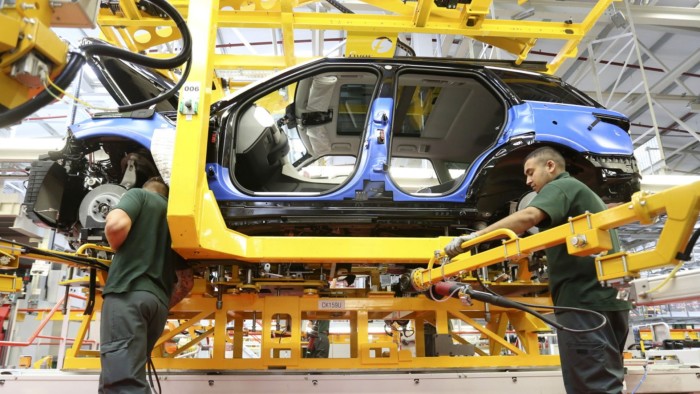Unlock the White House Watch newsletter for free
Your guide to what the 2024 US election means for Washington and the world
Britain’s carmakers have backed a decision by Prime Minister Keir Starmer not to retaliate against President Donald Trump’s 25 per cent tariffs on foreign-made cars imported to the US, as hopes fade of a transatlantic trade deal before they hit on April 2.
Instead, manufacturers demanded that ministers develop a “holistic approach” to supporting the UK auto industry, including through lower energy costs, increased training and better regulation.
Sarah Jones, industry minister, held talks with UK-based auto groups on Friday, including Jaguar Land Rover, Ford and Vauxhall owner Stellantis Friday, where the industry underlined the damage the tariffs would cause.
Three people briefed on the meeting said the industry did not want retaliation against the Trump tariffs but rather a “holistic approach” to boost Britain’s competitiveness.
While the UK’s car industry is overwhelmingly reliant on exports to Europe, the US accounts for one in six models shipped abroad and is the largest market for high-end manufacturers such as JLR, Bentley and McLaren.
Starmer and his team — including the UK’s ambassador in Washington Lord Peter Mandelson — are trying to take what Downing Street calls a “cool headed” approach to the Trump’s escalating trade offensive.
British officials privately admit that a UK-US economic deal may not be in finalised before April 2, when Trump’s auto tariffs and global reciprocal measures are due to be announced. But they remain hopeful that a deal can soon be reached to soften the impact of tariffs on the UK.
A draft “term sheet” for a deal is being negotiated by Mandelson, according to a person briefed on the talks. The deal would set out areas for future agreement in sectors such as technology, artificial intelligence and space, but in the short term Washington wants Britain to cut taxes affecting US companies.
One US official said the UK would definitely be hit with lower tariffs than the EU, mainly because Starmer was considering cutting or dropping Britain’s digital services tax that targets US tech firms.
Trump has said he will announce “reciprocal” tariffs on trading partners who had taken advantage of low US trade barriers while maintaining higher tariffs and taxes on American goods.
One person familiar with the talks between the US and UK said a deal between the two sides would be unlikely to emerge by next Wednesday, given the complication of making changes to the UK’s digital services tax, which raises about £800mn a year.
In talks with foreign officials more broadly, Trump’s commerce secretary Howard Lutnick has said the US will be announcing steep tariffs on its major trading partners on April 2.
Earlier this week, the EU’s top trade negotiator told other European officials that he expected the US to issue tariffs “in the realm of 20 per cent” against all 27 member states, according to two people familiar with his briefing.
The UK government said it was “disappointed by the US decision to impose global tariffs on the auto industry”, but added: “We continue to have productive discussions on securing a wider economic deal.”




